Police: Nanny stabbed herself upon mother's arrival STORY HIGHLIGHTS - NEW: Nothing appeared amiss between the nanny and children, a resident says
- The mother returned home to find the crime scene in a bathroom
- The family vacationed with Ortega in her native Dominican Republic
- The slain children were 2 and 6 years old
New York (CNN) -- The New York nanny suspected in the killings of two children in her care began knifing herself when their mother entered the bathroom and saw the bodies in the bathtub, police said Friday. "We believe now that the nanny began to stab herself as the woman entered the room," Police Commissioner Ray Kelly told reporters in a revised account of Thursday's events. "We initially thought that had already been done but now information is coming out that she did it as the mother entered the bathroom." Earlier, police had said that Marina Krim found nanny Yoselyn Ortega, 50, on the bathroom floor of the family's Upper West Side luxury apartment with self-inflicted wounds. In the tub lay the clothed bodies of two of Krim's children: Leo, who had recently celebrated his second birthday with "Pinkalicious-inspired cupcakes;" and his 6-year-old sister, Lucia, who had performed "beautifully in her ballet recital" in May. Both children had been repeatedly stabbed, police said. Ortega started stabbing herself in the neck with a kitchen knife, police said. Her wrists were slit. "The charge is still to be determined," Kelly said. A mother's greatest fear Krim had left the two children with the nanny, known as "Josie," to take her third child, 3-year-old Nessie, to a swim lesson at a nearby YMCA, Kelly said. She had expected to meet the nanny at a dance class for the 6-year-old around 5:30 p.m. When the nanny and children didn't show up, Krim went up to the apartment, where she found the lights were off, police said. Krim then returned to the lobby and asked a doorman whether he had seen her two other children leave with the nanny; he had not. "There comes a time when she goes looking for her children and enters the bathroom and finds her 6-year-old daughter and son stabbed to death in the tub," Kelly said. Leo, left, and Lucia Krim were discovered dead in a bathtub by their mother. That's when neighbors heard a scream. The children's father, Kevin Krim, a senior vice president for CNBC Digital and former Yahoo executive, was en route back home from the West Coast. Police broke the news to him at John F. Kennedy International Airport. "A member of the CNBC family has suffered an unimaginable loss," NBC Universal said in a statement. "The sadness that we all feel for Kevin, Marina and their family is without measure." The nanny was taken to a hospital, where she was in critical but stable condition. The bodies of the two children were removed from the building on a single stretcher and taken to a hospital where they were pronounced dead. Ortega was heavily sedated and under police watch on Friday at Weill Cornell Medical Center, said Deputy Police Commissioner Paul Browne. Kelly said she was breathing with the aid of a tube and unable to talk. A native of the Dominican Republic, Ortega had been a naturalized U.S. citizen for 10 years. Friends had introduced the family to Ortega, and she had worked for them since Leo's birth two years ago, police said. She lives at another address on Manhattan's West Side with her son, her sister and her niece, Kelly said. "We're just grieving. Worst nightmare anyone could ever imagine," said grandmother Karen Krim, who lives in California. "We don't have a clue what set her off." Police on Thursday evening escorted from the apartment building the mother and her 3-year-old daughter, covering them with a white sheet to shield them from photographers and gawkers. The mother was treated at a hospital for trauma, police said. More at: http://www.cnn.com/2012/10/26/us/new-york-nanny-deaths/index.html?hpt=us_c2
Frenzied preparations as East Coast braces for possible 'superstorm' STORY HIGHLIGHTS - NEW: Centered 330 miles south of Cape Hatteras, Sandy has 75 mph winds
- The storm is responsible for at least 45 deaths in Caribbean, Central America
- The mid-Atlantic and Northeast could see flooding, high winds, major power outages
- People are stocking up on essentials and sandbags in preparation of the storm
Are you affected by Hurricane Sandy? Send us your pictures and videos but stay safe. (CNN) -- Got bottled water? Food? Sandbags? Batteries? Toilet paper? Those are questions that millions of people in the mid-Atlantic and Northeast are asking themselves this weekend, as they prepare for Hurricane Sandy -- which has already proven to be a deadly storm and is threatening heartache, and headaches, as it creeps toward the region. Local and state officials have joined meteorologists in trumpeting the storm's potential breadth and impact, especially if it collides with a cold front from the West to create a "superstorm" that stalls over the Eastern Seaboard for days. Computer models predict portions of Delaware, Maryland and Virginia could see up to a foot of rain, according to the CNN Weather Unit. And even though it's still October, communities in and around the Appalachian Mountains could be socked by heavy snow. More at: http://www.cnn.com/2012/10/27/us/tropical-weather-sandy/index.html?hpt=us_c1
Implant scandal sparks EU medical device
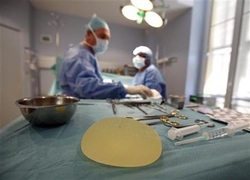 Implant scandal sparks EU medical device rule revampBy Charlie Dunmore and Kate Kelland | Reuters – Wed, Sep 26, 2012
BRUSSELS/LONDON (Reuters) - The European Union said it wants tougher rules governing the safety and monitoring of medical devices after weak EU regulations were partly blamed for a global scandal over French-made breast implants.
The plans will affect a huge range of products, from contact lenses to pacemakers to pregnancy testing kits to high-tech medical equipment such as life support machines.
Major manufacturers of medical devices include Johnson & Johnson, Medtronic, Boston Scientific,Abbott Laboratories, Allergan and Smith & Nephew.
Investigations last year showed that hundreds of thousands of women around the world had been implanted with substandard silicone products made by defunct French company Poly Implant Prothese (PIP), which safety regulators had failed to stop for more than a decade.
The scandal prompted calls for Europe to toughen controls on medical devices, which are currently overseen by an ad hoc network of up to 80 national assessment agencies.
"Everybody was shocked by the scandal involving fraudulent breast implants which affected tens of thousands of women in Europe and around the world," EU health commissioner John Dalli said as he outlined draft proposals for the new rules on Wednesday
The proposals take into account lessons from the PIP implant scandal AND include a scrutiny panel which would monitor the national agencies' assessments.
"They (the panel) would have the possibility to pick out medical devices on certain risk-based criteria to decide whether to go into an in-depth analysis of the processes," Dalli told reporters at a news conference.
INDUSTRY AND CONSUMER GROUPS CONCERNED
Industry body Eucomed, which represents about 22,500 medical technology companies in Europe, said it was unhappy with the proposal for the new scrutiny panel procedure, which it said would "hamper innovation" whilst providing no extra safety nets for patients.
"The current regulatory framework has provided a high level of safety for patients in Europe without delaying them access to life-saving medical technologies," Serge Bernasconi, Eucomed's chief executive, said in a statement.
"Let's not unnecessarily push away Europe's strong innovation and research capabilities to other continents at a time when they are urgently needed."
European Consumer Organisation (BEUC) argued, on the other hand, that the plans fall short of increasing quality and safety standards and said medical device regulations should be beefed up to levels similar to those required for pharmaceuticals.
"It is unacceptable that consumers are afforded different protection levels depending whether they have an artificial heart valve or take medicine for diabetes," said Monique Goyens, head of BEUC.
She noted that if a there is a problem with a drug, patients can stop taking them, but if an implanted device is problematic, patients may face invasive and risky surgery to have it removed.
Among other main changes proposed is an extension of the current legal definition of medical devices to include breast and other aesthetic implants.
Independent assessment agencies will be given greater powers to monitor device manufacturers, including unannounced factory inspections and regular product testing, while EU governments will be obliged to improve their supervision of the agencies.
Better product traceability systems will also be introduced so that people can be alerted more rapidly to safety concerns surrounding a particular device.
The European market for medical devices was estimated at 95 billion euros (123 billion) in 2009.
The legislation must be jointly approved by EU governments and lawmakers, which could take up to two years.
($1 = 0.7715 euros)
(Editing by James Jukwey and Hans-Juergen Peters)
BY:503832 ___
 _Cannot play media. You do not have the correct version of the flash player. Download the correct version Swedish alert over fake pork meat Sweden's National Food Agency has issued a warning after as much as 20 tonnes of meat labelled as beef turned out to be coloured pork. An investigator at the agency, Pontus Elvingson, told the BBC that tests were still being done to identify the dye. The Swedish firm Heat AB imported the meat from a supplier in Hungary called Filetto. One of the suspect batches originated in Argentina. Checks show that the dyed meat was first sold in Sweden a year ago. It is not yet clear if Filetto also exported doctored pork to other countries. The Swedish agency has alerted EU authorities. The BBC was unable to reach Filetto for comment. Contamination threat Mr Elvingson said the fake beef had been sold to several Swedish retail outlets, including restaurants. So far about 3.5 tonnes has been removed from sale. "There is no indication that Heat AB sent any of the meat abroad," he told the BBC by phone. Heat AB was not registered as a food company, he added. In Sweden, he said, "it's difficult to tell how much [doctored meat] there is and we don't know if it has all been sold". "The pigmentation of beef is different - this meat is red, but seems not so well dyed in parts, so maybe it was injected with needles," he said. If needles were used to inject the dye then bacteria could have been transferred from the meat's surface to the interior, increasing the risk of food poisoning, he added. The agency was tipped off by Swedish wholesaler Svensk Cater, following a complaint from a customer. Heat AB's Managing Director Ake Hultberg told Reuters news agency that the meat he had tried was good. "When we received the product, I looked at it, I opened a box and took a sample which I myself fried and looked at it. "And there was no problem with it but when it later came to Svensk Cater, there were fillets that were not beef but pork," he said, insisting that parts of the delivery were real beef.
BY:569853
A Langley men, 73, who allegedly amassed a collection of stolen vehicles with a second man and then allegedly punched the cop who came to search their property faces numerous charges, including assaulting a police officer.
Langley RCMP in March were tipped off about a new Dodge truck parked in the trees of a Langley residence, police said in a news release. The truck was gone by the time the police arrived.
The call came days after the 73-year-old reported that the 2012 Dodge pickup he was test driving from a local dealership had been stolen in a carjacking.
Also that month, a construction firm reported the theft of a Caterpillar loader and a Komatsu bulldozer.
The investigation expanded to include a truck theft reported in July 2011. The 30-year-old told police a truck on which he had agreed to do some engine repairs had been stolen.
RCMP’s street enforcement unit, armed with a search warrant, found the loader, bulldozer, keys to the new “carjacked” truck as well as the other truck at the men’s property in the 6600 block of 256 Street. They also recovered a large utility trailer found on the property that had been stolen from ICBC.
The new Dodge pickup was recovered at a residence of the older man’s.
When an officer arrived and announced they would be executing the warrant, he was allegedly punched in the face by the 73-year-old.
Roeloff Dendryver, 73, was charged with public mischief, assaulting a peace officer and possession of stolen property.
Derek Hall, 30, was charged with theft of a vehicle, two counts of possession of stolen property and public mischief.
Both are charged with theft of a vehicle and two counts of possession of stolen property. They are scheduled to appear in Surrey provincial court on Oct. 29.
Peace Arch shooting
Ms. Bowcock was struck by a bullet around 2 p.m. Tuesday after the suspected shooter entered Canada with Washington licence plates.
RCMP in B.C. say she remains in stable condition in hospital.
Sgt. Leon said the OPP was informed of the incident and have told members who knew and worked with the woman while she was in Ontario.
“Our concern is obviously for her health and well-being. Certainly as an organization we wish her all the very best with respect to a recovery from this tragic incident and our thoughts are with her and her family as they deal with this ordeal,” he said in an interview.
“But at the same time, we do respect the fact the RCMP and [Canada Border Services Agency] have a very, very important job to do. We’re confident they will find the answers to the questions as to how this happened.”
Sgt. Leon did not know Ms. Bowcock’s age. But he said she also donned a police uniform because she volunteered with the Middlesex OPP detachment and was trained to assist with various community events like parades and the fall fair.
She was working at the Douglas border crossing, commonly known as the Peace Arch crossing. A provincial traveller’s report said Highway 99 southbound, from about two kilometres north of the border, was not expected to reopen until at least 4 p.m. Wednesday due to the ongoing investigation.
“The first report at the scene revealed that a male, a lone male, had shot an officer in her booth,” Corporal Bert Paquet told reporters on Tuesday.
Cpl. Paquet also said the officer was breathing when she was loaded into an air ambulance and that it appeared she’d been shot in the neck.
“We haven’t confirmed the identity of the suspect yet,” he said.
“At the instant following the shooting of the officer, the lone male had been pronounced dead at the scene from what appeared to be a self-inflicted gunshot wound.”
Sergeant Jennifer Pound of Integrated Homicide Investigation Team said in a news release the unit would take over the file and was treating it as an attempted murder investigation.
Shirley Bond, B.C.’s minister of justice and attorney general, said the RCMP will be working with their colleagues in Washington state during the investigation.
She said Premier Christy Clark and Governor Chris Gregoire have talked about the incident, are committed to a safe and peaceful border and will work with federal officials in both countries to protect border guards.
Federal Public Safety Minister Vic Toews said he’s not interested in speeding up the arming of border guards, despite the shooting.
The CBSA said in 2006 that it planned to arm its 4,800 guards within 10 years, and so far, just under half have been trained.
But Mr. Toews says he’s concerned that any effort to hasten that training might compromise safety.
Ms. Bowcock had been working in a customs booth at the time, but it is not clear whether she is one of the more than 2,000 border guards who have been trained to carry a firearm.
Calling Canadian border guards “an extension of our Washington family,” Mr. Gregoire in a statement pledged full co-operation during the investigation.
“This tragedy hits especially close to home and reminds us all that our public safety officers put their lives on the line every day to protect the rest of us,” she said.
Glen Pederson, a local resident, said he heard two gunshots in the afternoon but didn’t think much of the noise.
“I thought it was these guys next door, it’s a construction site. There’s a house being built here, there’s been all kinds of banging going on for days and weeks.”
Mr. Pederson said when he heard a helicopter buzzing over his house, he went outside to his front patio and then walked over to the park at the border to see what was going on.
He said he could see a white van stopped near the first booth, closest to the customs building, and surrounded by yellow police tape.
Mr. Pederson said dozens of cars were still waiting at the crossing in the late afternoon.
“There was cops there so fast it wasn’t even funny,” he said.
Kevin McAllister, assistant general manager at the Peace Portal Golf Course, which is adjacent to the crossing, said an employee and several guests reported to him that they heard shots fired.
“Two shots were fired,” he said. “We’ve heard fire, police, ambulance heading southbound on [Highway] 99, which is probably about a couple hundred yards from the 18th green. So that’s what they heard when all hell broke loose.”
Mr. McAllister said he also heard and saw a police helicopter hovering over the 10th and 11th fairways, which are the closest fairways to the highway and the border crossing.
He said the helicopters stopped about 2:40 p.m.
“Staff are coming in, talking about it,” he said.
Kelsie Carwithen, a spokeswoman with the B.C. Ambulance Service, said one air and two ground ambulances were sent to the scene.
The Peace Arch border point is the third busiest crossing between Canada and the United States.
An average of 3,500 cars pass through the crossing on a slow day, and during peak periods about 4,800 vehicles will move through the border.
During those peak periods, border delays can reach four hours on either side of the border.
A Langley men, 73, who allegedly amassed a collection of stolen vehicles with a second man and then allegedly punched the cop who came to search their property faces numerous charges, including assaulting a police officer. Langley RCMP in March were tipped off about a new Dodge truck parked in the trees of a Langley residence, police said in a news release. The truck was gone by the time the police arrived. The call came days after the 73-year-old reported that the 2012 Dodge pickup he was test driving from a local dealership had been stolen in a carjacking. Also that month, a construction firm reported the theft of a Caterpillar loader and a Komatsu bulldozer. The investigation expanded to include a truck theft reported in July 2011. The 30-year-old told police a truck on which he had agreed to do some engine repairs had been stolen. RCMP’s street enforcement unit, armed with a search warrant, found the loader, bulldozer, keys to the new “carjacked” truck as well as the other truck at the men’s property in the 6600 block of 256 Street. They also recovered a large utility trailer found on the property that had been stolen from ICBC. The new Dodge pickup was recovered at a residence of the older man’s. When an officer arrived and announced they would be executing the warrant, he was allegedly punched in the face by the 73-year-old. Roeloff Dendryver, 73, was charged with public mischief, assaulting a peace officer and possession of stolen property. Derek Hall, 30, was charged with theft of a vehicle, two counts of possession of stolen property and public mischief. Both are charged with theft of a vehicle and two counts of possession of stolen property. They are scheduled to appear in Surrey provincial court on Oct. 29. Read more: http://www.theprovince.com/news/Langley+alleged+have+collected+stolen+vehicles+also+charged+with+punching/7404792/story.html#ixzz29acGF5rQ
504281 &T.W.
AustraliaA MAN who allegedly took his baby son from a southwestern Sydney home after a domestic violence incident will face court on Tuesday. Police on Monday issued a public alert about a five-month-old boy allegedly taken from his home in Canley Vale. They later arrested a 39-year-old man at a fast food restaurant car park in Villawood. The boy was given a health check in hospital and returned to his mother. The arrested man will appear in Bankstown Local Court on charges including endangering a child, assault and stalking. Read more: http://bit.ly/WfrJfN
South AfricaCAPE TOWN - One person was killed and two more were missing after a charter boat on a popular sight-seeing trip capsized off South Africa's Hout Bay near Cape Town, rescue officials said on Saturday. Two of those rescued from the twin-hulled catamaran "Miroshga" were French women, said Craig Lambinon, spokesman for the National Sea Rescue Institute. The boat was carrying 41 people, including crew, at the time of the accident, he said. "We recovered one person out of the hull, who has been hospitalized in a stable but serious condition," Lambinon said, adding that rescuers were trying to free another two under the hull. It was unclear what caused the boat to capsize in the cold waters close to Duiker Island, about three km from Hout Bay on the Atlantic Ocean side of the Cape Peninsula. The island is a popular destination for tourists eager to catch a glimpse of thousands of seals found there. Local media had previously reported that at least four people had died. MexicoGUADALAJARA, Mexico – Mexican marines have arrested a Los Zetas drug cartel leader allegedly linked to more than 300 killings across the country, including the massacre of 72 illegal immigrants and the murder of US tourist David Hartley, Milenio reported today.Salvador Alfonso Martinez Escobedo, nicknamed “The Squirrel,” was paraded in front of the media in Mexico City on Monday morning after he was captured following a gunfight on Saturday in Nuevo Laredo, a border city in the northern state of Tamaulipas, El Universal reported. "Squirrel is credited with being the mastermind of the deaths of 72 undocumented migrants in San Fernando," the Mexican Navy said in a statement cited by ABC News."[He] is the alleged perpetrator of the narco graves found in Tamaulipas state, with more than 200 bodies and the execution of more than 50 people by his own hand in different parts of the republic, [as well as] the murder of David Hartley, an American citizen killed at Falcon Dam on September 30, 2010." The Agence France-Presse said Martinez Escobedo is also accused of taking part in the killing of the police commander who was investigating Hartley’s death. Hartley and his wife were jet skiing on Falcon Lake on the Texas-Mexico border when he was shot in the head by gunmen, ABC News said. Martinez Escobedo is also suspected of being involved in two massive prison breaks in northern Mexico, AFP said. More than 60,000 people have been killed in drug-related violence since December 2006 when President Felipe Calderon deployed thousands of soldiers to fight organized crime. Some of the worst violence has been in the country’s north where gangs are battling for control of smuggling routes into the United States.
China's ZTE to post nine-month loss of up to 1.75 billion yuan 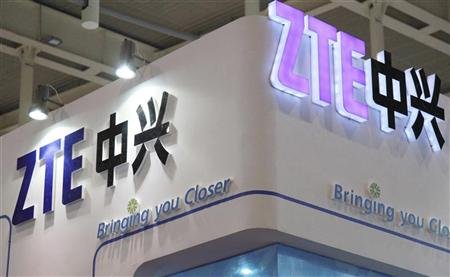 HONG KONG (Reuters) - Chinese mobile phone and telecoms equipment maker ZTE Corp will report a loss of as much as 1.75 billion yuan ($279.2 million) in the first 9 months of 2012, it said in a preliminary results announcement on the Hong Kong Stock Exchange on Sunday.
The Shenzhen-based company has suffered as a slowing economy has hurt sales and margins have come under pressure. ZTE said its loss will be between 1.65 billion yuan and 1.75 billion yuan. That could be a fall of more than 260 percent compared with the same period last year. Basic earnings per share will be a loss of between 0.48 yuan and 0.51 yuan.
The company is due to report final results at the end of the month.
ZTE said its results during the period were hurt by the Iranian market. The United States is investigating the company over the sale of banned U.S. computer equipment to Iran, which could be used to monitor landline, mobile and Internet communications. ZTE said it is cooperating with U.S. authorities.
Iran is under global sanctions because of allegations it is trying to develop nuclear weapons - something the country denies.
ZTE's bigger Chinese rival, Huawei Technologies Co Ltd, is also under scrutiny by the United States. U.S. lawmakers have accused the company of being a potential security threat.
For the full ZTE Hong Kong Stock Exchange announcement, please see: http://www.hkexnews.hk/listedco/listconews/sehk/2012/1014/LTN20121014006.pdf
($1 = 6.2672 Chinese yuan)
(Reporting by Claire Baldwin; Editing by Louise Heavens)
SOURCE: ( Yahoo.com)
200 Muslim rebels arrive to sign Philippine pact
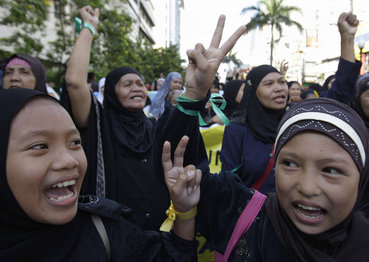 MANILA, Philippines (AP) — Worn down by decades of fighting and failed peace agreements, Muslim rebel leaders were euphoric but cautious Monday before they sign a preliminary peace pact with the Philippine government aimed at ending one of Asia's longest-running insurgencies.
The agreement is the first major step toward a final settlement that grants minority Muslims in the southern Philippines broad autonomy in exchange for ending the violence that has killed tens of thousands of people and crippled development. Many of the rebel leaders interviewed said a lot of work lies ahead in convincing Filipino Muslims to accept a new administrative region.
A product of 15 years of negotiations facilitated by neighboringMalaysia, which wants stability on its doorstep, the agreement sets in motion a roadmap to a final document that the Moro Islamic Liberation Front and Philippine President Benigno Aquino III's government plan to clinch before his six-year terms ends in 2016.
The signing will be witnessed by Aquino, Malaysian Prime Minister Najib Razak and rebel chairman Al Haj Murad Ebrahim, who will set foot for the first time in Manila's Malacanang presidential palace, where officials prepared a red-carpet welcome.
"That first step alone signifies a giant leap in the relations between the two sides," said the presidential adviser for the peace process, Teresita Deles.
Michael Mastura, a member of the rebel negotiating team, likened Monday's agreement to a takeoff. "But then we have to fly, reach a plateau, and move on."
Sonny Davao, deputy chief of the rebel army, said guerrilla commanders were ready to shift from armed struggle to helping build a new Muslim-administered region.
"We have to transform ourselves because we have responsibilities and obligations to our people and to Islam," said Davao, who shed his camouflage uniform for a dark coat with tie for the signing ceremony. "We are one in supporting the decision of our entire leadership."
Murad has seldom appeared in public in past years. Aquino met Murad secretly in Tokyo for the first time last year to underscore their commitment to settle the rebellion.
About 300 Muslims from Manila and southern provinces held a noisy rally outside the palace on Sunday in support of the preliminary accord, yelling "Allahu Akbar," or "God is great." They called for more development in the resource-rich but impoverished southern Mindanao region, the homeland of minority Muslims in the predominantly Roman Catholic nation.
Security has been tightened in the capital, although no disruptions were expected.
The agreement is to be signed by government negotiator Marvic Leonen and his rebel counterpart, Mohagher Iqbal. It outlines general agreements on major issues, including the extent of power, revenues and territory of a new Muslim autonomous region to be called Bangsamoro.
It calls for the establishment of a 15-member Transition Commission to draft a law creating the new Muslim-administered region. Rebel forces will be deactivated gradually "beyond use," the agreement says, without specifying a timetable.
The deal is the most significant progress in years of tough bargaining with the 11,000-strong Moro group to end an uprising that has left more than 120,000 people dead and displaced about 2 million others. Western governments have worried over the presence of small numbers of al-Qaida-linked militants from the Middle East and Southeast Asia seeking combat training and collaboration with the Filipino insurgents.
One of those extremist groups, the Abu Sayyaf, is not part of any negotiations, but the hope is that the peace agreement will isolate its militants and deny them sanctuary and logistical support they had previously received from rebel commanders.
One of those hardline commanders, Ameril Umbra Kato, broke off from the main Moro insurgents last year. Kato's forces attacked the army in August, prompting an offensive that killed more than 50 fighters in the 200-strong rebel faction.
Abu Misri Mammah, a spokesman for Kato's forces, said Sunday that his group does not recognize the peace accord.
"That's a surrender," he said. "We won't waver from our armed struggle and continue to aspire for a separate Muslim homeland that won't be a creation of politicians."
Mastura said that rebel leaders have to forge a strong peace deal that could withstand any opposition.
"It is easy, just gather a few men and disturb, because there are many firearms around. But that's not the mainstream line," Mastura said. "That is why we have to show that this is the way rather than their way."
The new Muslim region is to include an existing autonomous territory made of five of the country's poorest and most violent provinces. The Moro rebels earlier dropped a demand for a separate Muslim state and renounced terrorism.
Iqbal has said his group would not lay down its weapons until a final peace accord is concluded. He said the insurgents could form a political party and run in democratic elections to get a chance at leading the autonomous region.
___
Associated Press writer Oliver Teves contributed to this report.
Source: (Yahoo.com)
US Digs into Cyber Warfare- Asian Times
Recently the US House of Representatives Intelligence Committee took a meat-ax to Huawei, the Chinese telecommunications giant, and its little brother ZTE in a 60-page report on national-security issues posed by the two companies.
The conclusion:
· They're commies.
· We can't trust 'em. Or, as the executive summary put it:
The United States should view with suspicion the continued penetration of the US telecommunications market by Chinese telecommunications companies. [1]
Specifically, the committee recommended that the government
not purchase any Huawei or ZTE equipment.
The committee rubbed further salt in the wound by recommending that private companies not buy any Huawei or ZTE telecommunications equipment either.
It also invited the legislative branch to expand the jurisdiction of the Committee on Foreign Investment in the United States (CFIUS) to enable it to block procurement of Chinese telecommunication equipment by US customers, in addition to exercising its traditional powers of blocking foreign investment deemed harmful to US security. CFIUS had previously blocked Huawei's participation in a deal to take 3Com private - which was brokered by Mitt Romney's Bain Capital - and recently denied Huawei's attempt to buy 3Leaf, a California cloud computing company.
Certainly not the clean bill of health that Huawei was hoping for when it invited the US government to investigate its operations.
It is clear that the Chinese companies were given the Saddam Hussein treatment. Just as the Iraqi despot was put in the impossible position of proving a negative - that he did not have any weapons of mass destruction - Huawei and ZTE executives were called upon to prove their companies were not untrustworthy.
Mission unaccomplished, for sure.
The public committee report is little more than a litany of complaints about unclear answers, insufficient disclosure, inadequate clarification, failure to alleviate concerns, making non-credible assertions, failure to document assertions, failure to answer key questions, refusal to be transparent, and so on and so forth. Huawei, in particular, was dinged for "a lack of cooperation shown throughout this investigation".
The committee's conclusion:
Throughout the months-long investigation, both Huawei and ZTE sought to describe, in different terms, why neither company is a threat to US national-security interests. Unfortunately, neither ZTE nor Huawei [has] cooperated fully with the investigation, and both companies have failed to provide documents or other evidence that would substantiate their claims or lend support for their narratives.
To drive a stake into the heart of any dreams that Huawei or ZTE had of providing "mitigation assurances" - bureaucratese for acceptable measures to allay US security concerns - the committee made the interesting decision to dump all over the British government.
Keen on Chinese investment in its backbone telecommunications networks, the British government accepted the reassurance provided by a cyber-security center, funded by Huawei and staffed by UK citizens with security clearances, with the job of vetting Huawei products for hinky bits.
The US intelligence committee dismissed these efforts as futile given the complex, opaque and frequently updated character of telecommunications software:
The task of finding and eliminating every significant vulnerability from a complex product is monumental. If we also consider flaws intentionally inserted by a determined and clever insider, the task becomes virtually impossible.
In terms of specific evidence of Huawei and ZTE malfeasance, there is little meat on the bones of the public document.
On the technical side, the evidence supporting Huawei and ZTE infiltration of the US telecommunications software presented in the public report was less than earth-shaking:
Companies around the United States have experienced odd or alerting incidents using Huawei or ZTE equipment. Officials with these companies, however, often expressed concern that publicly acknowledging these incidents would be detrimental to their internal investigations and attribution efforts, undermine their ongoing efforts to defend their systems, and also put at risk their ongoing contracts.
Similarly, statements by former or current employees describing flaws in the Huawei or ZTE equipment and other potentially unethical or illegal behavior by Huawei officials were hindered by employees' fears of retribution or retaliation.
Presumably, the confidential annex to the committee report makes a more compelling case, but one has to wonder.
According to The Economist:
Years of intense scrutiny by experts have not produced conclusive public evidence of deliberate skulduggery, as opposed to mistakes, in Huawei's wares. BT, a British telecoms company that buys products vetted in [the cyber-security center at] Banbury, says it has not had any security issues with them (though it rechecks everything itself, just to be sure). [2]
In a sign that no existential smoking cyber-guns had been revealed, the worst punishment for Huawei's lack of cooperation that the committee could apparently mete out (other than trying to destroy Huawei's US business) was threatening to forward information to the Justice Department concerning possible corporate malfeasance in the routine areas of immigration violations, fraud and bribery, discrimination, and use of pirated software by Huawei in its US operations.
It can be taken as a given that the People's Republic of China (PRC) is intensely interested in cyber-espionage - diplomatic, military, and commercial - against the United States and cyber-warfare against US government, security, and public infrastructure if and when the need arises.
However, the case that Huawei is a knowing or even a necessary participant in these nefarious schemes is unproved.
Nevertheless, Huawei's attempts to generate a clean bill of health for itself with Western critics are pretty much futile.
That's because government weaponization of communications technology is a given - for everybody, in the West as well as in China.
Beneath the freedom-of-information rhetoric, the West is converging with the East and South when it comes to protecting, monitoring and controlling its networks.
In the United States, providing government law enforcement with back-door access to networks, aka "lawful intercept", is a legal requirement for digital telecom, broadband Internet, and voice-over-IP service and equipment providers under the CALEA (Communications Assistance to Law Enforcement Act) law. The Federal Bureau of Investigation (FBI) is currently lobbying the US administration and the Federal Communications Commission to require that social-media providers such as Facebook provide similar access so that chats and instant messaging can also be monitored in real time or extracted from digital storage.
In Europe, similar law-enforcement access is institutionalized under the standards of the European Telecommunications Standards Institute.
Particularly in the environment after the attacks of September 11, 2001, law enforcement has expressed anxiety about "going dark" - losing the ability to detect and monitor communications by bad actors as data and telecommunications moved from fixed-wire analog systems to digital, wireless, and band-hopping protocols.
The situation is aggravated by the availability of theoretically unbreakable public/private key 128-bit encryption.
(I say "theoretically", by the way, because creation of the private key relies on a random-number generator on the encrypting computer. A recent study found that some programs were spitting out non-random random numbers, raising the possibility that a certain spook agency of a certain government had been able to diddle with the programs to generate certain numbers preferentially, giving said spook agency a leg up to crack the private keys through otherwise ineffective brute-force computing techniques.) [3]

Poisoning the (Female) Tourist in Asia Thailand This summer, four young women set off on vacations in Southeast Asia. Here’s what they had in common: They were all from North America; they were all in their 20s; they were all pretty, bright, adventurous. And one more commonality: They all died. Audrey and Noemi Belanger Two of these deaths occurred in June in Thailand, two in June in Vietnam. All four women were diagnosed with the symptoms of acute poisoning. And while some explanations have been offered by the authorities, these have been either vague, improbable (see my recent post on the deaths in Thailand) or opaque (see CNN’s Friday story on the deaths in Vietnam). My favorite statement is one from the Thai police declaring that it could be “months before official results are revealed if
ever.” (Emphasis mine). If ever? What kind of a police response is that? Does it mean that investigators know something they don’t want to tell? Or that they don’t have a clue? It’s no wonder that the rumor mills are spinning stories of murder, of a serial killer stalking female tourists in Southeast Asia, of a police cover-up to protect the valued tourist industry. The serial killer idea, of course, builds on earlier mysteries: the 2009 death of a Seattle woman, still unsolved today. The similar and also unexplained death of a 22-year-old woman from Norway the same year. An odd cluster of deaths in another Thai city during winter of last year, including a 23-year-old woman from New Zealand. The other theory circulating is that the police are covering up the careless use of insecticides by Asian hotels; an explanation denied, of course, by the hotel industry. It doesn’t explain, of course, why most of these deaths involve females in their 20s. But there’s some support for it from an independent investigation into the 2011 death of New Zealander Sarah Carter. Carter was staying at a hotel in Chiang Mai, Thailand, when she died (along with five other tourists). The police blamed a coincidental outbreak of food poisoning. But Carter’s family turned over tissue samples to investigative journalists from a New Zealand television station. The resulting laboratory analysis reportedly found traces of an old-time organophosphate pesticide called chlorpyrifos. Sarah Carter This insecticide has been around since the mid-1960s. It’s a Dow Chemical Company product sold in the United States under the tradename Dursban. Like all organophosphate pesticides, it’s highly effective due to its action on the the nervous system Although it’s only considered moderately toxic to humans, chlorpyrifos is linked to neurological effects and can pose developmental risks to children. Although still widely used in agriculture, it’s no longer registered for use in residential settings in the U.S. But Dow does market it for such uses in developing countries, leading to suspicions that it had been surreptitiously sprayed in Carter’s hotel to treat for bed bugs. The problem with this theory — as with so many of the theories floated in the case of these Asian tourist deaths — is that it doesn’t hold up well under scrutiny. Autopsies reportedly found myocarditis (put simply, an inflammation of the heart muscle) in some of the dead tourists but the classic symptoms of chlorpyrifos poisoning tend to be those of classic neurotoxicity, starting with dizziness and loss of coordination, ending with a gradual shutdown of heart and lungs. As Thailand’s tourism-focused publication, Phuket Wan, reported the investigation into the death of Sarah Carter and others in 2011 simply ended in mystery. Cathy Huynh and Kari Bowerman The possibility of chlorpyrifos or some other insecticide poisoning has also been raised in this summer’s deaths of American Karin Bowerman, 27, of Lake Geneva, Wisconsin, and Canadian Cathy Huynh, 26, of Hamilton, Ontario. The two friends – both working as English language teachers in South Korea – were backpacking in Vietnam, when they were admitted to a hospital in the beach town of Nha Trang in late July, suffering from vomiting, dehydration and difficulty breathing. Bowerman died that day; Huynh two days later.
China media: Xi Jinping's new leadership Hong Kong papers say political reform during Xi Jinping's time is unlikely The climax of China's week-long Communist Party congress - the unveiling of the Politburo Standing Committee - fills Friday's newspapers. The People's Daily editorial says the new Standing Committee under General Secretary Xi Jinping's leadership will be a "strong collective leadership to take on a historic mission". The editorial says the party congress proved the Communist Party "is a mature, united, harmonious and innovative Marxist Party that can always retain its vanguard role". "Socialism with Chinese character is an unprecedented, majestic undertaking," it went on. "On the new journey, we have greater responsibility and a heavier burden. We must maintain firmer belief and make more tenacious efforts in order to seize a new victory for socialism with Chinese characteristics." A front-page commentary in the People's Daily Overseas Edition says party members reaffirmed their "religious faith" in communism as the party anthem was played. "Western society should learn that China's communism is not identical to that of the Cold War era", it says. The
Global Times' English editorial says: "Public opinion will wield more and more influence over China's politics and the Party is increasing its capacity to react to this trend. Therefore, a more vigorous reform could be expected." "However, as Chinese have been deeply marked by the Cultural Revolution and tragic experiences of some foreign countries, they are willing to seek change while remaining wary of 'revolution'." The paper's Chinese editorial criticised Western media's "contradictory" view of China by being optimistic about China's future while criticising its political system. "As long as China maintains quicker development than the West, passes a few more key points, then Western media's description of China's political system will eventually collapse from inside." Regional papers focus on how to implement the policies laid out in President Hu Jintao's speech to the congress. The Beijing Times' editorial says the greatest task for all party members now is to take responsibility and "write the story of people's livelihood and well-being", and the key is to "distribute promptly, fairly and in an increased amount the fruit of development to the people". Focusing on Xi Jinping's speech, Beijing News' editorial says: "We all familiar with the repeated promises from the ruling party of improving people's life. Xi Jinping, in his speech, used more simple and more colloquial language to express the promise. This is refreshing." "People have the right to long for a better life. The ruling party has demonstrated its commitment by promising a path to make this right a dream come true." Meanwhile, the Beijing Times and other papers also praised Hu Jintao's "noble character and unimpeachable integrity" for handing over party and military leadership simultaneously. Guangzhou's Southern Metropolis Daily publishes on its front page a photo showing Mr Xi and Mr Hu shaking hands, apparently trying to portray the power transition as a peaceful one. China Daily's editorial says: "Former CPC General Secretary and Central Military Commission Chairman Hu Jintao resigned from both positions at the same time has been aptly read as full confidence in the Party's new leaders." "As they bid farewell to the forefront of national leadership, Hu Jintao and his retiring CPC colleagues deserve congratulations and thanks for what they have brought about and left behind. They have given us plenty of reasons to be confident." But newspapers in Hong Kong, such as the Hong Kong Standard and AM730, say commentators do not believe the new party leadership will bring any political reform to China. Commentators told Hong Kong newspapers that although Hu Jintao intends to end gerontocracy - rule by old men - the fact that six of the seven Standing Committee members are backed by former President Jiang Zemin implies no political reform will be possible during Xi Jinping's time. The editorial of Ming Pao Daily News says Xi Jinping could face a personnel problem as five of his colleagues will reach their retirement age by the next party congress in 2017, breaking the chain of stable leadership formation for two consecutive party congress. US President Obama has urged
Burma's rulers to continue political reforms, ahead of a historic visit. On Monday, Mr Obama will be the first serving American president to visit Burma, which has been praised in the West for reforms over the past year. Answering critics who have highlighted continued human rights abuses in Burma, Mr Obama said the country was moving in "a better direction". But he said "much greater progress" was needed in future. "I don't think anybody is under any illusion that Burma's arrived, that they're where they need to be," Mr Obama told reporters at a press conference in Thailand. "On the other hand, if we waited to engage until they had achieved a perfect democracy, my suspicion is we'd be waiting an awful long time," he added. Mr Obama is on a tour of South East Asia, which began in the Thai capital Bangkok on Sunday - his first foreign trip after his re-election as president. There he met Thai Prime Minister Yingluck Shinawatra and King Bhumibol, the world's longest-serving monarch. Unresolved conflicts In Burma, he is due to hold talks with President Thein Sein and opposition leader Aung San Suu Kyi. He will also give a speech at Rangoon University, one of the hotbeds of pro-democracy protests in 1988 that were violently suppressed by the regime. In the past year, the Burmese authorities have freed hundreds of political prisoners and held the country's first contested election. Continue reading the main story “Start Quote Campaigners are asking why such an important visit had to happen so soon, apparently before Mr Obama's people had secured any concessions from the Burmese government” End Quote Jonathan Head BBC News, Rangoon Over the past year the US and other Western nations have relaxed the sanctions they had imposed on Burma, which was ruled by a brutal military regime for five decades. However, around 300 political prisoners remain in detention, according to rights groups. Ethnic conflicts also remain unresolved, including an increasingly bitter confrontation between Muslim Rohingyas and Buddhist Rakhine people in Rakhine state. US officials say they have been seeking assurances that Burma had distanced itself from North Korea, after accusations emerged in 2010 that the two states were sharing nuclear technology. After visiting Burma, Mr Obama will head to Cambodia to join a meeting of the regional bloc Asean. Analysts say the US is trying to counter the dominating influence of China in the region. But US officials have repeatedly insisted that they want to work with China.
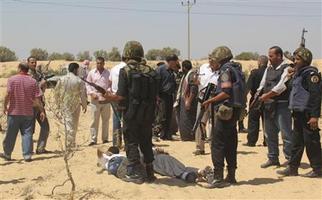 Three members of Egypt's security forces have been shot dead by gunmen in north Sinai peninsula, officials say.A fourth was wounded in an attack on their car in the suburbs of El Arish. Egypt launched an offensive against militants in Sinai following the killing of 16 policemen on the Egyptian-Israeli border August. Security in the area has deteriorated since the fall of Hosni Mubarak in February 2011, with Islamists appearing to gain a foothold, analysts say. "Armed men who might belong to a jihadist group attacked a police vehicle and fired on its passengers before fleeing," a security source was quoted as saying. Two policemen and a soldier were killed and another police officer was wounded, Egypt's interior ministry said. Security forces threw a cordon around the city in a bid to capture the gunmen, the AFP news agency reports. Troop build-up Egypt launched "Operation Eagle" in early August, sending thousands of troops backed by tanks and heavy equipment into Sinai. They were responding to the killing of 16 policemen in a raid on their base near the Rafah crossing with Gaza Strip, not far from El Arish. It was the deadliest and most brazen attack against Egyptian troops in the Sinai region for decades. After killing the soldiers, the militants crossed the border with Israel in an apparent attempt to carry out another attack. However, they were killed in Israeli air strikes. The build-up of Egyptian troops and heavy weapons in Sinai has caused concern in Israel. Since 1982, when Israeli troops withdrew, Sinai has remained under a special security regime mandated by the peace treaty the two countries signed in 1979, which restricts Egypt's freedom of military action. Egyptian President Mohammed Mursi has stressed that there is no cause for concern, maintaining that his country is committed to all international treaties. http://www.bbc.co.uk/news/world-middle-east-20192613
 Bishop Tawadros new pope of Egypt's Coptic ChristiansBishop Tawadros has been chosen as the new pope of Egypt's Coptic Christians, becoming leader of the largest Christian minority in the Middle East. His name was selected from a glass bowl by a blindfolded boy at a ceremony in Cairo's St Mark's Cathedral. Three candidates had been shortlisted. The 60-year-old succeeds Pope Shenouda III, who died in March aged 88. He succeeds as attacks on Copts are on the increase, and many say they fear the country's new Islamist leaders. The other two candidates were Bishop Raphael and Father Raphael Ava Mina. They were chosen in a ballot by a council of some 2,400 Church and community officials in October. 'In God's hands' Their names were written on pieces of paper and put in crystal balls sealed with wax on the church altar. A blindfolded boy - one of 12 shortlisted children - then drew out the name of Bishop Tawadros, who until now was an aide to the acting leader, Bishop Pachomius. Bishop Pachomius then took the ballot from the boy's hand and showed it to all those gathered in the cathedral. Many leading Copts believe the new pope should play a less overtly political role. Activists hope that ordinary Copts can make their voices heard by winning more seats in the now democratically elected parliament. Yet the new pope may want to make his views known quickly on how prominent a role Islamic, or Sharia, law should play in the new constitution currently under negotiation. So from this ancient ritual, some very modern problems face Egypt's new Coptic pope. Strict measures were in place to make sure there was no foul play during the televised ceremony: the three pieces of paper with candidates' names were all the same size and tied the same way. Copts say this process ensures the selection is in God's hands. Bishop Tawadros will be enthroned in a ceremony on 18 November. The new pope has studied in Britain, and has also run a medicine factory, the BBC's Jon Leyne in Cairo reports. He is a man of broad experience and with managerial skills, our correspondent says, adding that he will need all those talents to lead the Copts as they face an uncertain future in a country now debating the role of Islam following last year's revolution. Our correspondent says no-one in Egypt expects the new pope to introduce radical changes to the deeply conservative church. Pope Shenouda died in March. Under his leadership, the Coptic Church expanded significantly, including outside its traditional Egyptian base. He was a passionate advocate of unity among the Christian churches, and also clashed with then President Anwar Sadat, particularly over their conflicting views on the future of Egypt's relationship with Israel. Coptic Christians have long complained of discrimination by the Egyptian state and the country's Muslim majority. But when President Hosni Mubarak was ousted last year and succeeded by the Muslim Brotherhood, their fears grew. In October 2011, 25 people died in clashes with the security forces after a protest march in Cairo over the burning of a church. http://www.bbc.co.uk/news/world-middle-east-20192922
Turkey hits targets inside Syria after border deaths
Student#: 1355088 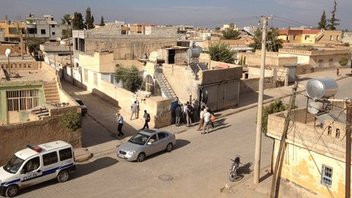 4 October 2012 Last updated at 07:41 ETStudent#: 1355088Turkey has renewed firing at targets inside Syria after two women and three children were killed by shelling from across the border on Wednesday.
Several Syrian troops were killed by Turkish fire, a UK-based Syrian activist group said.
Syria says it is investigating the shelling in the town of Akcakale.
The Turkish parliament is discussing authorising troops to cross into Syria. But government sources say Turkey is not planning to declare war on Syria.
A government official said the retaliatory shelling - now in its second day - was only a "warning" to the authorities in Damascus.
The UN Security Council is to meet later, following a Turkish request for the body to take "necessary action" to stop Syrian "aggression".
Nato has held an urgent meeting to support Turkey, demanding "the immediate cessation of such aggressive acts against an ally".
The US, the UK, France and the European Union have already condemned Syria's actions.
Russia, which is allied to President Bashar al-Assad's government, has asked Damascus to acknowledge officially that the cross-border attack was "a tragic accident" which will not happen again.
In Syria itself as many as 21 members of Syria's elite Republican Guards have been killed in an explosion and firefight in the Qudsaya district of Damascus, the UK-based Syrian Observatory for Human Rights told the BBC.
'Abominable attack'
Turkish security officials said Turkey resumed artillery strikes on Syria early on Thursday, targeting the Tall al-Abyad district, some 10km (six miles) inside the Syrian border.
Turkey's territory has been hit by fire from Syria on several occasions since the uprising against Mr Assad began, but Wednesday's incident was the most serious.
Ankara's response marks the first time it has fired into Syria during the 18-month-long unrest there.
The office of Turkey's Prime Minister Recep Tayyip Erdogan said on Wednesday that Turkey would "never leave unanswered such kinds of provocation by the Syrian regime against our national security".
Parliament in Ankara is meeting in an emergency session in response to a government request for the military to be authorised to launch cross-border operations.
Akcakale has been fired on several times over the past few weeks.
Residents have been advised to stay away from the border, and more than 100 schools have been closed in the region because of the violence in neighbouring Syria.
Syrian government forces are attempting to cut rebel supply routes by winning back the border crossing at Tall al-Abyad which the rebels seized last month.
Syria's Information Minister Omran Zoabi offered Damascus's "sincere condolences to the families of the victims and to our friends the Turkish people".
Without admitting the shelling, Mr Zoabi said: "The border with Turkey is long, illegal arms trafficking takes place along the border and armed groups move along the border."
Syria, he said, respected the sovereignty of neighbouring countries.
Wednesday's attack is believed to be only the second time that people have died as a result of violence spilling over the border from Syria into Turkey.
Two Syrian nationals were killed on Turkish soil in April by stray bullets fired from Syria.
The BBC's Jim Muir in Lebanon says Ankara is not interested in a confrontation and will keep its retaliation to a minimum.
The Turkish armed forces have in the past moved into northern Iraq in pursuit of Kurdish militants who had bases there.Source: http://www.bbc.co.uk/news/world-middle-east-19822253
Egypt tensions spark clashes in Cairo's Tahrir Square
Student#: 1355088 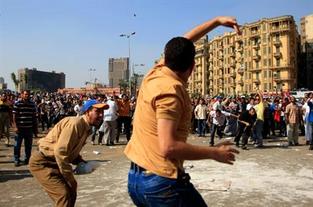 12 October 2012 Last updated at 17:18 ETStudent#: 1355088
Fresh clashes have broken out in the Egyptian capital Cairo in the worst violence since President Mohammed Mursi took office at the end of June.
Scores of people were reported injured as supporters and opponents of Mr Mursi fought in Tahrir Square.
Tensions are high after Egyptian judges criticised Mr Mursi's attempt to remove the country's top prosecutor.
It follows the acquittal of 24 people accused of attacks on protesters during last year's uprising.
Witnesses said a rally critical of the president was taking place in Tahrir Square on Friday when a crowd of his supporters stormed their stage.
Fighting broke out and protesters pelted each other with stones, bottles and petrol bombs.
The Health Ministry put the number of injured at 110, state TV said.
"My conclusion is that Mursi is just the president of the [Muslim] Brotherhood, that's all," said one protester, Sayed al-Hawari.
Another, Rania Mohsen, said: "We are here against turning the state into a Brotherhood state. We do not want to replace the old regime with one like the old one."
However, Mursi supporter Moez Naggar accused the other camp of behaving like "thugs".
"We have to give Mursi a chance," he said.As darkness fell at least two buses, believed to belong to the Muslim Brotherhood which backs Mr Mursi, were seen on fire near the square.
An urgent screen caption on Egypt's state-run Channel 1 TV read: "Muslim Brotherhood group denounces regrettable incidents in Tahrir Square, calls on its members to withdraw from the square."
In unrest elsewhere, protesters in Egypt's northern industrial town of Mahalla stormed the headquarters of the Muslim Brotherhood and tore down pictures of President Mursi, security officials told BBC Arabic.
The BBC's Jon Leyne in Cairo says that, 100 days into his term, this is the first time President Mursi has experienced big demonstrations against him.
However, it is not clear how much it represents wider discontent with the Muslim Brotherhood and the government, he says.
Egyptians are frustrated that so far the new president appears to have done little to change the country or boost the economy, our correspondent adds.
Opponents are also angry at Egypt's proposed new constitution, which they see as too dominated by Islam.
Angry responseEarlier, a group of Egyptian judges criticised President Mursi's attempt to remove the country's top prosecutor as a "farce".
The president said he was reassigning Prosecutor-General Abdel Maguid Mahmoud - regarded as a figure from the era of ousted President Hosni Mubarak - as Vatican envoy.
Mr Mahmoud is refusing to go.
The move against Mr Mahmoud followed an angry public response to the acquittal of the 24 people who had been accused of sending men on camels and horses to break up a protest in Cairo in 2011, leaving several people dead.
Those accused included Fathi Sorour and Safwat al-Sherif, former speakers of Egypt's two houses of parliament.
Prosecutors said Mr Sherif, who was also the secretary general of Mubarak's National Democratic Party (NPD), had "contacted MPs, members of the NDP and financiers of the party, inciting them to disperse the protests in Tahrir Square by force and violence".
The case is the latest flashpoint between Mr Mursi's government and figures associated with the Mubarak era.Source: http://www.bbc.co.uk/news/world-middle-east-19928452
Kuwait's emir warned at opposition protest
Student#: 1355088
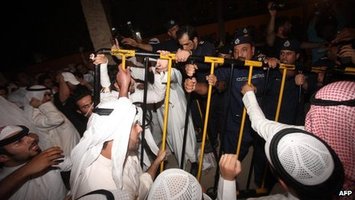 16 October 2012 Last updated at 09:30 ET
Student#: 1355088
Several protesters were hurt and others detained when protesters clashed with security forces outside Kuwait's parliament building, reports say.
At least 5,000 people took part in the demonstration on Monday evening.
In an address that surprised observers, ex-MP Mussallam al-Barrak warned the emir he would not be allowed to "take Kuwait into the abyss of autocracy".
The opposition fears the government will try to alter legislation before upcoming parliamentary elections.
The emir, Sheikh Sabah Al Sabah, dissolved the National Assembly earlier this month after the emirate's highest court rejected a government appeal aimed at changing electoral boundaries.
The government said it wanted to safeguard the outcome of future polls; critics said it planned to alter the boundaries to its advantage.
'We will not allow you'On Monday, thousands of Kuwaitis defied a request by the authorities not to participate in the anti-government demonstration in Kuwait City.
Witnesses said at least five people, including the son of the prominent opposition figure Ahmed al-Saadoun, were detained when demonstrators clashed with security forces manning barriers outside the National Assembly building in Erada Square.Several people were also reportedly hurt in the skirmishes.
Earlier, demonstrators listened to a speech by Mussallam al-Barrak which many observers said was striking in its criticism of the 83-year-old emir.
"We will not allow you, your highness, to take Kuwait into the abyss of autocracy," he warned. "We no longer fear your prisons and your riot batons."
"If your highness decides to change the election law by emiri decree, then you alone are responsible for complicating matters and you alone are responsible for resolving it."
His remarks drew repeated chants of "We will not allow you, we will not allow you" from the crowd.
The dispute began in June, when the Constitutional Court declared illegal February's elections, in which the Islamist-led opposition made significant gains. The court reinstated the previous parliament.
Last year, protesters stormed the parliament building when the government tried to prevent former Prime Minister Sheikh Nasser al-Mohammed al-Sabah facing questions about the alleged payment of bribes to pro-government MPs. Sheikh Nasser and his cabinet resigned the following month, triggering February's elections.
Opposition leaders have called on the emir to announce a date for the upcoming parliamentary elections. Under the constitution, they must be held within 60 days of the dissolution of the National Assembly.Source: http://www.bbc.co.uk/news/world-middle-east-19964068
Place all three news stories here (paste over top of these words here) - make sure to include the title for each story so the readers can clearly see that these are three separate stories.
Also, if you wish, you can add a YouTube video or a picture.
Please include links to the original news story.
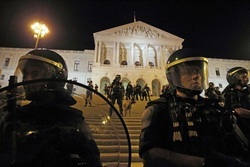 Portugal reveals tough 2013 budget
The Portuguese government has revealed details of its draft budget for 2013, one of the harshest in the country's recent history.
Finance Minister Vitor Gaspar confirmed the average income tax rise would increase from 9.8% in 2012 to 13.2% next year.
Portugal was granted a 78bn-euro ($100bn; £63bn) bailout last year.
Mr Gaspar said the budget was the only way for the country to meet its targets under the bailout.
"We have no room for manoeuvre," he said.
"Asking for more time [under the bailout] would lead us to a dictatorship of debt and to failure."
He also announced spending cuts worth 2.7bn euros next year, which would include laying off 2% of the country's 600,000 public sector employees.
About 2,000 protesters gathered outside parliament on Monday to demand the resignation of the government, chanting: "The people united will never be defeated."
Acceptance of austerity measures has turned to anger
Mr Gaspar said the budget would allow Portugal to reduce its budget deficit to 4.5% in 2013. It must eventually get its deficit below the European Union target of 3% of GDP.
Portugal is currently experiencing its worst recession since the 1970s, with the unemployment rate above 15%, and predicted to rise to 16.4% next year.
Opposition Socialist Party leader Antonio Jose Seguro described the draft budget as "a fiscal atomic bomb".
Portugal's main trade union, the CGTP, said it was "an attack on the dignity of the people" and daily newspaper Diario Economico declared it "an insult to the Portuguese people".
Wages hitAs in Spain and Greece, Portugal has seen huge street protests against the austerity cuts that are needed to meet the demands of the bailout.
In September, the government decided not to raise social security contributions next year from 11% to 18% after protests against the proposed move.
A general strike is planned for 14 November.
The income tax rise in the budget amounts to a month's wages for many workers.
The budget also reduces Portugal's income tax brackets from eight to five, and there will be a one-off 4% surcharge tax on all workers' earnings in 2013.
Capital gains tax will increase from 25% to 28%.
The government expects the economy to shrink by at least 3% this year and by 1% next year, although many economists forecast a greater contraction in 2013.
Source: http://www.bbc.co.uk/news/business-19953167
Google privacy policy rethink demanded by EU
Google's lucrative advertising model depends on ads tailored to users based on personal data.
Google is to be told by the EU to change the way it gathers personal information if it is to avoid "high risks to the privacy of users".
Twelve recommendations were outlined in a letter signed by 24 of the EU's 27 data regulators, Reuters reported.
It follows a nine-month investigation into the company's data collection practices.
Since March, Google has combined data from sites like YouTube and Gmail to better target its advertising.
It meant 60 individual privacy policies for individual Google-owned sites were merged into a single policy for all of its services.
Reuters quoted the letter ahead of the EU's official announcement, which will take place on Tuesday.
Google has maintained the policy complies with EU law.
But regulators immediately raised concerns about the changes when they were implemented earlier this year.
The French data regulator, CNIL, was tasked by the EU to investigate the policy on behalf of the other countries in the EU.
Location dataThe investigations were overseen by the Article 29 Working Party, a group of representatives from each member state tasked with promoting the application of the EU's Data Protection Directive.
It stopped short of declaring Google's data gathering practices illegal, but made clear 12 measures the company must put in place to satisfy the concerns.
"Combining personal data on such a large scale creates high risks to the privacy of users," the letter is understood to say.
"Therefore, Google should modify its practices when combining data across services for these purposes."
Those recommendations are said to include a focus on personal information and browsing records, as well as the collection of location-based data and credit card details.
On Monday, a source at Google told the BBC that the company would look closely at the recommendations, but noted that the findings were not as serious as some industry watchers had predicted.
'Unprecedented'Auke Haagsma, a director for the Initiative for a Competitive Online Marketplace (Icomp), told the BBC that Google should have anticipated the EU's stance.
"The EU was very clear, even before Google introduced its changes, it almost certainly violated EU law."
Mr Haagsma said the agreement, which involved representatives from all of the EU member states, represented an "unprecedented" level of concern, and posed a threat to Google's future operations.
"In Google's business model there is an inherent conflict of interest," he said.
"On the one hand Google wants to offer good services to users, but on the other it's being paid for by advertising.
"Google is collecting so much data. If people realise that, they are afraid people will say no."
Source: http://www.bbc.co.uk/news/technology-19953241
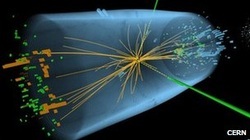 Big Bang and religion mixed in Cern debate
Some of Europe's most prominent scientists have opened a debate with philosophers and theologians over the origins of everything.
The event, in Geneva, Switzerland, is described as a search for "common ground" between religion and science over how the Universe began.
It will focus on the big bang theory.
The conference was called by Cern, the European Organization for Nuclear Research, in the wake of its Higgs boson discovery.
Cern is the home of the Large Hadron Collider, the world's largest particle accelerator, situated beneath the French-Swiss border region near Geneva.
Professor Jim Al-Khalili explains what the Higgs boson is and why its discovery is so important
The first speaker at the conference was Andrew Pinsent, research director of the Ian Ramsey Centre for Science and Religion at Oxford University.
He said that science risked "trying to turn society into a machine" if it did not engage with religion and philosophy.
"Science in isolation is great for producing stuff, but not so good for producing ideas," he told the BBC.
"Einstein began by asking the kinds of questions that a child would ask, like what would it be like to ride on a beam of light."
That, Dr Pinsent said, was what science should return to.
Prof Rolf Heuer, director of Cern, explained that the Higgs results provided a "deeper insight and understanding of the moments after the Big Bang".
He added that he hoped, by the end of the conference, that delegates from very different backgrounds would be able to "start to discuss the origin of our Universe".
Co-organiser Canon Dr Gary Wilton, the Archbishop of Canterbury's representative in Brussels, said that the Higgs particle "raised lots of questions [about the origins of the Universe] that scientists alone can't answer".
"They need to explore them with theologians and philosophers," he added.
Heated debateThe organisers are expecting some disagreements during the three-day event.
For example, one of the speakers, Prof John Lennox from Oxford University, has been an outspoken critic of atheist scientists in the past.
Most recently, he took issue with Prof Stephen Hawking's assertion that God did not create the Universe.
In an article in the Daily Mail, he said that he was certain that Prof Hawking was wrong.
Prof Lennox wrote: "When Hawking argues, in support of his theory of spontaneous creation, that it was only necessary for 'the blue touch paper' to be lit to 'set the universe going', the question must be: where did this blue touch paper come from? And who lit it, if not God?"
Dr Wilton, though, said he was hopeful that "scientists, theologians and philosophers alike might gain fresh insights from each other's disciplines".
"This is such an exciting conference," he told the BBC.
"It is the first time Cern has invited theologians and philosophers to debate with them.
"But by the end... we might find new ways of understanding our own positions.
"We might even find new ways of talking to each other about the beginning of the world."
The conference is being organised by Wilton Park, an agency of the UK Foreign and Commonwealth Office.
Source: http://www.bbc.co.uk/news/world-europe-19870036
By Greg Botelho, CNN updated 12:02 PM EDT, Tue October 9, 2012 Man dies after roach-eating contest STORY HIGHLIGHTS - Edward Archbold was among those in a contest at a Deerfield Beach reptile store
- He won a python after eating dozens of cockroaches and worms, a sheriff's office says
- Archbold later fell ill, collapsed and was pronounced dead at a southeast Florida hospital
- The store says participants signed waivers, insects were "safely and domestically raised"
(CNN) -- A 32-year-old man downed dozens of roaches and worms to win a python at a Florida reptile store, then collapsed and died outside minutes later. Edward Archbold was among 20 to 30 contestants participating in Friday night's "Midnight Madness" event at Ben Siegel Reptiles in Deerfield Beach, authorities said. The participants' goal: consume as many insects and worms as they could to take home a $850 python. Archbold swallowed roach after roach, worm after worm. While the store didn't say exactly how many Archbold consumed, the owner told CNN affiliate WPLG that he was "the life of the party." "He really made our night more fun," Ben Siegel told the station. Soon after the contest was over, Archbold fell ill and began to vomit, the Broward County Sheriff's Office said Monday. A friend called for medical help. Then, Archbold himself dialed 911, the store said in a Facebook post. Eventually, he fell to the ground outside the store, the sheriff's office said. An ambulance took him to North Broward Medical Center, where he was pronounced dead. The Broward Medical Examiner's Office conducted an autopsy and are awaiting test results to determine the cause of his death. No other contestant fell ill, the sheriff's office said. "Very saddened by this. I mean, it was a shock," Siegel told WPLG. "Eddie was a very nice guy. We just met him that night, but everybody that works here was very fond of him." Luke Lirot, who says he is legally representing the store, said in a post on the store's Facebook page that all participants "signed thorough waivers accepting responsibility for their participation in this unique and unorthodox contest." "The consumption of insects is widely accepted throughout the world, and the insects presented as part of the contest were taken from an inventory of insects that are safely and domestically raised in a controlled environment as food for reptiles," Lirot said. In the wild, cockroaches are scavengers that pick up various bacterial organisms such as salmonella while walking through spoiled food, the New York City Department of Health and Mental Hygiene explains on its website. Cockroaches themselves don't transmit disease, though "many disease-causing organisms can grow and multiply in their guts and can then be deposited ... during defecation." Pharaoh Gayles was one of those who took part in the contest. He explained his reasoning to CNN affiliate WPTV. "Some of the snakes were pretty expensive," he said. "I thought if I could eat the bugs to get one, it'd be a good idea." (CNN) -- Thirty-five years ago, a scene in the first "Star Wars" film captivated movie-goers: Luke Skywalker peering across the landscape of Tatooine -- a desert planet dominated by a pair of setting suns. This week, reality trumped (science) fiction with an image even more enthralling: two amateur astronomers poring through data from deep, distant skies and discovering a planet with four suns. NASA's website calls the phenomenon a circumbinary planet, or a planet that orbits two suns. Rare enough on its own -- only six other circumbinary planets are known to exist -- this planet is orbited by two more distant stars, making it the first known quadruple sun system. Researchers presented the finding Monday night at the annual meeting of the Division of Planetary Sciences of the American Astronomical Society in Reno, Nevada. The discovery of the four-sun planet by amateur scientists takes crowd sourcing to new heights. The expression, coined by Wired magazine editor Jeff Howe, describes tasks that are outsourced to a disparate group of people to come up with a solution. In this case, the Planet Hunters group made data from NASA's $600 million Kepler telescope available to the public through its website and coordinates their findings with Yale astronomers. In combing through the data, "Citizen scientists" Robert Gagliano and Kian Jek spied anomalies that confirmed the existence of the special planet, now known as PH1 -- short for Planet Hunters 1 -- the first heavenly body found by the online citizen science project. The planet is a little bigger than Neptune, with a radius about six times greater than Earth. "I celebrate this discovery for the wow-factor of a planet in a four-star system," said Natalie Batalha, a Kepler scientist at the NASA Ames Research Center at Moffett Field, California. "Most importantly, I celebrate this discovery as the fruit of exemplary human cooperation -- cooperation between scientists and citizens who give of themselves for the love of stars, knowledge, and exploration." CNN USA news headlines
U.S. motorist wounds Canadian border officer in shooting, then kills self By Michael Martinez and Catherine Shoichet updated 9:03 PM EDT, Tue October 16, 2012 STORY HIGHLIGHTS - NEW: A male motorist shoots female Canadian border officer in her booth, police say
- NEW: Motorist then apparently kills himself, police say
- NEW: Border officer is breathing when she's airlifted to hospital
- NEW: Authorities shut down the Peace Arch across from Blaine, Wash(CNN) -- A Canadian border officer was shot in her booth Tuesday afternoon by a motorist, who then apparently killed himself, Canadian police said.
The shooting occurred at a border crossing across from Blaine, Washington, where the motorist was traveling from, authorities said. The border officer was breathing before being airlifted to a hospital, but further details about her condition were not immediately available, said Surrey Royal Canadian Mounted Police Cpl. Bert Paquet. The man who shot her was pronounced dead at the scene, apparently from a self-inflicted gunshot wound, Paquet said. He was driving a car with Washington state plates into Canada, he said. Authorities had yet to confirm the man's identity late Tuesday afternoon, Paquet said. Canadian authorities closed the border crossing immediately after the shooting. The closed British Columbia port is known as the Douglas or Peace Arch crossing, and Canadian authorities are asking motorists to use another area crossing, said Faith St. John with the Canada Border Services Agency. The Royal Canadian Mounted Police were investigating. Dave Noble told CNN affiliate CTV that he saw a chaotic scene when he arrived at the crossing Tuesday. About a dozen border guards with guns drawn encircled a white van. "They had it surrounded. ... You knew something had gone down," he said. "It's very shocking. I feel terrible for the border guard. I come here quite a bit, and don't know any of them personally ... but there are some really nice people that work here." Authorities told Lisa Kennedy that she and her family would be waiting for a while. She saw all the ambulances and police cars pull up to the scene, where the van's doors were opened. "They said, 'Hold on, you guys are going to be here for a long time. We've had an injury, a fairly serious one," Kennedy told CTV. Jagdar Randhawa said he heard the gunfire. "All of sudden, I hear two shots," he said Tuesday afternoon. "Then we wait for a while. We're still waiting for a long time." Canadian Minister of Public Safety Vic Toews said he was "deeply concerned by the news of the shooting today at the Peace Arch border crossing of a CBSA officer." "This event is a sobering reminder of the dangerous conditions faced daily by the men and women of our law enforcement agencies as they work to protect the safety and security of Canadians," Toews said. About 60 vehicles were stranded on the Canadian side of the border. Hurricane Sandy: Winds topple top of construction crane in New York Published 19 minutes ago Share on twitterShare on facebook crane ANDREW KELLY/REUTERS A collapsed crane dangles beside a building under construction, as Sandy made its approach, in New York on Monday. Alex Consiglio Staff Reporter New Yorkers were left worrying Monday night whether a broken crane snapped by the winds of Superstorm Sandy would collapse at any moment. The crane, at a construction site near Central Park, had its boom crack and collapsed against its tower, where it remained dangling as the storm pounded the city. MORE: We liveblog the superstormNew York Mayor Michael Bloomberg said the crane had been inspected Friday, as other construction cranes had ahead of the storm, and that the cause of the accident remained unknown. Engineers went to the top of the structure on Monday, which will be 90 storeys once it is built, to examine the crane but stopped short of attempting any repairs, officials said. "It's conceivable that nobody did anything wrong whatsoever and it wasn't even a malfunction, it was just a strange gust of wind," Bloomberg told a news conference. "Just because it was inspected, that doesn't mean that God doesn't do things or that metal doesn't fail. There's no reason to think at this point in time that the inspection wasn't adequate," he said. Ron Brodek, 66, has been building and inspecting cranes since 1968 and currently operates Brodek Crane Inspectors, Inc., in Arizona. Brodek told the Toronto Star the crane may have cracked because it wasn’t “put to bed” properly, meaning its operator didn’t shut it down correctly. Brodek said a crane of that height has a release swing brake that allows it to “weather vane.” When the brake is released, the crane is able to sway with the wind. Ultimately, this allows the boom to face the opposite direction of the wind, said Brodek. If that brake wasn’t released, and the boom was left at a high angle, chances of it cracking would have been increased, said Brodek. As for it now crashing to the ground, Brodek said the chances are minimal. “It’s being held up by the boom cables,” said Brodek, adding as long as the main structure, the tower, doesn’t fail, the crane should not collapse. Brodek added it’s going to be a “long, drawn-out process” to get the boom safely to the ground. “You’re going to have to get something up there to get it down by cutting it loose.” New York firefighters closed streets for several blocks surrounding the site, evacuating 300 apartments in three buildings. Passersby stared in amazement and apprehension. Some stopped to take photos of the building. "It's fascinating, I saw it on TV and came out to see it. But it's also scary," said Sam O' Keeffe, 25, a bartender who lives in the neighbourhood told Reuters. The building, known as One57 and designed by Christian de Portzamparc, has been climbing ever higher and, at 306 meters, it will tower over other buildings near Columbus Circle at the southwest corner of Central Park. Ninety-two luxury condominiums will sit atop a five-star Park Hyatt hotel. Two of those units were under contract for more than $90 million each, The New York Times reported last month, citing the president of building developer, Extell Development Company. Extell, which did not respond to requests for comment on Monday, announced in May it had reached $1 billion in sales and that half of its units had sold in six months. Occupancy was set for 2013. The contractor was Australia's Lend Lease Construction and Canada's Pinnacle Industries own the crane, said Mary Costello, a spokeswoman for Lend Lease. “We are working with structural engineers and the DOB (Department of Buildings) on evaluating any additional measures that can be taken to secure the boom and crane structure,” Costello said. With files from Reuters
Hurricane Sandy death toll rises to 39, eight million still without power: ‘This is not over yet,’ Obama says
The death toll in the aftermath of Hurricane Sandy rose to 39 Tuesday, but U.S. President Barack Obama warns it could rise higher yet as the remnants of the superstorm are still a threat and some people remain unaccounted for. “This is still not over,” Obama said at a news conference at Red Cross headquarters in Washington Tuesday afternoon. Obama said he would be joining New Jersey Gov. Chris Christie Wednesday to inspect the damage in the ravaged state. The president had already announced he was cancelling all of his campaign events for Wednesday. • Death toll rises to 39 • Damage may be as high as $20 billion • New York’s subway may be closed for the week • NYC neighbourhood burns to ground, more than 50 homes lost • Three N.J. towns flooded • About 8 million without power • Power may take a week to return The storm interrupted the presidential campaign a week before Election Day, giving Obama an opportunity to look presidential as he oversees the government response. He drew praise from Christie, who has been a strong supporter of Obama’s opponent. Sandy, which crashed ashore with hurricane-force winds in New Jersey overnight as the biggest storm to hit the country in generations, swamped parts of New York’s subway system and Manhattan’s Wall Street district, closing financial markets for a second day. http://news.nationalpost.com/2012/10/30/hurricane-sandy-death-toll-rises-to-39-millions-still-without-power-this-is-not-over-yet-obama-says/
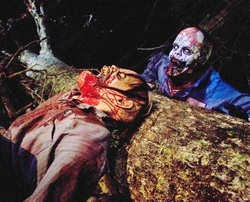 South Surrey forest turns into zombie combat zone
Blood, smoke, pyrotechnics — it’s all part of the experience created by a movie special effects wizard
Ever wonder how you would handle a zombie apocalypse? Here’s your opportunity to find out.
The Zombie Combat Zone opens Friday for a 10-week run on the Panther Paintball grounds, at 19022 16th Ave. It’s an immersive zombie-fighting experience that will have combatants light up the undead with paintballs in a south Surrey forest overrun by brain eaters.
“It’s 57 acres of the creepiest forest ever,” said Jen Yarnell, general manager of the ZCZ. “It is pitch black in there.”
But don’t rush in with guns blazing; you have limited ammunition and you have to keep your cool as you’re on a delicate military mission to rescue some scientists. Soldiers guide you along the way, but it’s up to you to defend yourself and your group against wave after wave of zombies.
It seems straight out of a horror movie, and rightfully so. The mastermind behind the production is Ron McCall, a special effects wizard of the local film industry who’s worked on a number of thrillers.
“He’s been in film for 15 years, so he’s a prop master,” Yarnell said.
The idea came from discussions between McCall and others over what they would do if they were caught in a zombie apocalypse similar to ones in such films as Zombieland and Shaun of the Dead.
“He just thought, ‘I’m going to make a zombie apocalypse and see how you guys do’,” said Yarnell.
Groups of eight to 12 combatants dress up in tactical gear and are met by a soldier who reads them the riot act. While she wouldn’t reveal many details, Yarnell did say there’s a storyline to it, as opposed to simply mowing down hoards of zombies with paintballs.
“It’s basically live theatre,” she said, noting that the entire interactive show runs for about 45 minutes. “There’s a whole script to this thing.”
With McCall’s background in special effects, there will be no shortage of blood, smoke, strobe lights and even pyrotechnics to accompany the sounds of gunfire, air raids and attacks in the distance.
Because of the frightening nature of the Zombie Combat Zone, it has an age limit of 16 and up, although those 15 and under can go zombie hunting with a parent. In the two weeks leading up to Halloween, the organizers will host Zombiefest, an all-ages haunted walk through the forest.
The Zombie Combat Zone is set to run every Thursday through Sunday until Nov. 15, and organizers hope to make it a seasonal production between spring and fall next year. Panther Paintball holds regular paintball in the daytime while the ZCZ runs from dusk to 1 a.m.
Web Link is: http://www.vancouversun.com/entertainment/movie-guide/South+Surrey+forest+turns+into+zombie+combat+zone/7209384/story.html
 Child killer sentenced, mother outraged
An Airdrie man convicted of manslaughter in the death of a baby has been sentenced to three years in prison.
Daniel Berge was convicted of manslaughter in the death of four-month-old Emelia Matwiy.
Berge admitted to shaking the baby. He was convicted because he failed to get Emelia medical attention.
Crown prosecutors were asking for a 10 year sentence, saying Berge exposed Emelia to prolonged suffering. The defence asked for a sentence of two years. After the sentence was handed down, Emilia's mother began yelling at Berge in the courtroom, angry that he did not receive a stiffer sentence.
Web link is: http://www.globaltvedmonton.com/pages/media.aspx?id=6442615670&mediaID=4500361
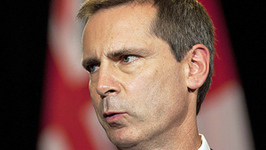 Dalton McGuinty resigned with little choice, pundits sayDalton McGuinty's shocking decision to resign as Ontario premier and prorogue the legislature had commentators speculating today about the future of the Liberal MPP and his party. On Monday, beaten down by a series of scandals, McGuinty announced his resignation and that he was adjourning the legislature. After 16 years as party leader and nine years as premier, McGuinty said it’s time for “renewal” in the Liberal Party. He will remain as MPP for Ottawa-South until the next election. On Monday, McGuinty would not answer questions about his future, including speculation that he might seek leadership of the federal Liberals. The Ontario Liberals have been under fire for months for an out-of-control air ambulance service and faced a second contempt motion Monday for cancelling gas plants in Mississauga and Oakville at a cost of hundreds of millions of dollars to taxpayers. However, McGuinty insisted it wasn't the controversy over the gas plants that prompted his sudden resignation Most commentators reacting Tuesday to McGuinty’s decision said Ontario’s premier had hit a roadblock getting his political agenda through a minority legislature. McGuinty needed support from other parties to ensure public-sector wages are frozen as the province tries to pare back a deficit in the $14-billion rangeSpeaking on CBC's Metro Morning, Henry Jacek, a political science professor at McMaster University in Hamilton, said McGuinty's resignation was forced once he realized support for his economic plan wasn’t forthcoming. “The Conservatives were not going to support him on that,” said Jacek. “Since he doesn’t have a majority in the legislature, it means he can’t really implement his plan on public finances. His economic plan had hit a dead end and there was really nowhere for him to go." Also speaking on Metro Morning, the CBC news anchor and political analyst Robert Fisher said McGuinty struggled to adjust to operating a minority government after holding a majority for eight years. “This government had a really difficult time finding that proper balance," said Fisher. "It was probably time for him to go. He couldn't make this minority government work." Fisher also pointed to McGuinty's low popularity in recent polls and a disappointing third-place finish to the NDP in a September byelection in Kitchener-Waterloo.Successor up in the airNames spoken of as potential leadership candidates to replace McGuinty include Housing Minister Kathleen Wynne, Finance Minister Dwight Duncan, former cabinet minister George Smitherman, and Energy Minister Chris Bentley, who has been the focus of the opposition attacks and original contempt motion over the cancelled gas plants. Fisher said the Ontario Liberals don't have an automatic choice for a successor. "There is no Justin Trudeau waiting in the Liberal backbenches at Queen's Park to take over the party and revitalize it." Speaking on CBC News Network on Tuesday, Fisher also said he's doubtful McGuinty has plans to make a run at the federal Liberal leadership. "I think federal Liberals are looking for a quick fix and Dalton McGuinty is not a quick fix," said Fisher.Decision to adjourn legislature criticizedBoth Ontario opposition parties were also critical of McGuinty’s decision to adjourn the legislature. With the legislature now prorogued, the scheduled finance committee hearings into the gas plant cancellations and all other legislative business will be cancelled. There won't be any committees either because the three parties have been unable to agree on their makeup under a minority government. McGuinty said the timing of the recall of the legislature would have to wait until the Liberals had picked a new leader. "I want my successor to make that decision," he said.
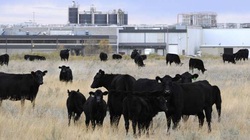 Round 2
TCFIA denies two-tier inspection for Canadian and export beef
The Canadian Food Inspection Agency says the same safety standards apply to meat for domestic consumption and for overseas exports and reports to the contrary are "categorically false."
The embattled federal food safety agency is reacting to a media report that inspectors at the XL Foods processing plant in Brooks, Alta., were told to ignore contamination on cattle carcasses unless they were destined for Japan.
A memo to inspectors, dated September 2008, does indeed instruct them to ensure all "Japan-eligible" beef has been 100 per cent verified for removal of fecal, intestinal and spinal cord materials.
The same memo tells inspectors at the "Japan Dura Mater" station on the production line to ignore such contamination for meat that is not destined for Japan.
But a spokeswoman for the agency says the memo was about division of labour and that the Japan inspection station was not the end of the line.
Lisa Gauthier of the CFIA says in a release that there is "zero tolerance for any form of contamination" and that there are multiple points of detection along the processing line.
Largest beef recall in CanadaXL Foods was the scene of the largest beef recall in Canadian history this fall after meat contaminated with E. coli was stopped at the Canadian-American border in September.
People in at least four provinces were found to have been made ill by the E. coli strain and the XL plant only reopened at the end of October.
Agriculture Minister Gerry Ritz issued a release in an effort to assure consumers there is not a two-tier inspection system for domestic and export purposes.
"CFIA continues to ensure the meat sold in Canada is just as safe as meat being exported to other markets — including Japan," Ritz said.
"CFIA continues to ensure that meat processed in Canada meets our high food safety standards. This is required by law and acknowledged by our global customers as a superior food safety system."
o edit.
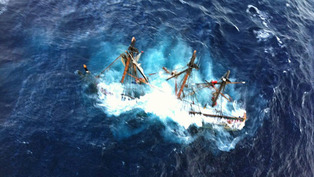
HMS Bounty captain search enters 4th day U.S. Coast Guard says Robin Walbridge still in the realm of "functional survivability"
U.S. Coast Guard officials say the search for the captain of the Nova Scotia-built replica tall ship HMS Bounty is still active, despite the man being in the Atlantic Ocean for more than three days.
Robin Walbridge has been missing since Monday morning, when the crew of HMS Bounty decided to abandon ship in high seas brought on by Hurricane Sandy off the coast of North Carolina. Walbridge didn't make it to a life-raft with the rest of his crew.
Lt. Michael Patterson, a spokesman for the U.S Coast Guard, told CBC News that Walbridge is still in the realm of "functional survivability."
"This is still an active search," he said Thursday.
"This is not a recovery operation; this is still a live search and rescue operation. We are searching with the intent of bringing a survivor home."
According to the surviving crew members of HMS Bounty, Walbridge was wearing a survival suit, which could increase his odds of survival.
The 16 crew members of the vessel decided to abandon ship after getting caught in 5.5-metre seas about 320 kilometres southeast of Hatteras, N.C.
The Bounty sank several hours after the evacuation.
As the crew members scrambled to get to covered life-rafts, three of them — including Walbridge, 63, and deckhand Claudene Christian, 42 — were washed overboard.
Walbridge has not been seen since. Christian's body was recovered from the seas on Monday.
The third person who was washed overboard made it to a life-raft and was among the 14 people hoisted onto helicopters and taken to shore.
Patterson said a Hercules C-130 aircraft was launched at first light on Thursday to continue the search, and the Coast Guard cutter Gallatin has been searching the ocean all overnight.
He said the fact that Walbridge was wearing a survival suit — a large rubber suit designed to keep the wearer dry and warm even in frigid water — plays into the "equation of survivability."
"The other factors include factors as basic as a person's will to live. Their strength as a swimmer, whether they were able to make it to debris or life-rafts," Patterson said.
"At some point, time alone will dictate whether or not we can reasonably expect this to continue to be a live rescue operation."
U.S. Coast Guard officials said conditions on the ocean were getting better with each passing day. Thursday brought 26 C water temperatures and 16.6 C air temperatures, along with 27 knot winds and 1.2 metre waves.
Searchers have scoured thousands of square kilometres of ocean since the rescue effort began on Monday.
"The sheer area of what we're covering makes it challenging," Patterson said.
The replica of HMS Bounty, which launched in Lunenburg in 1960, was made famous in a 1962 movie starring Marlon Brando — Mutiny on the Bounty. It has also appeared in Pirates of the Caribbean: Dead Man's Chest starring Johnny Depp.
Place all three news stories here (paste over top of these words here) - make sure to include the title for each story so the readers can clearly see that these are three separate stories.
Also, if you wish, you can add a YouTube video or a picture.
Please include links to the original news story.
 Winnipeggers asked to swap guns for cameras
Winnipeggers are being asked to point and shoot cameras rather than guns.
Throughout the month of November, anyone who wants to get rid of a firearm can arrange to do so with police.
The program, dubbed Pixels for Pistols, is a partnership between the city police, Henry's Photo, and Panasonic.
In exchange for a working firearm, they'll receive a Panasonic FH8 digital point-and-shoot camera and a Henry’s school of imaging gift card, a value of $240.
For every non-working or replica firearm someone turns in, they'll get a Henry's school of imaging gift card of $75.
People who particpate will receive amnesty from the Firearms Act for possession and storage offences, however each gun will be investigated should any be linked to criminal activity, individuals could face prosecution.
“As a community it is important that we work together to ensure the safety of our citizens. This initiative is a practical way for citizens to help police keep guns out of the hands of criminals, making Winnipeg a safer community,” said acting Chief Devon Clunis.
Police stress they do not want firearms turned in at the photoshop or any Winnipeg police stations.
Instead, anyone who wants to handover their handgun is asked to call police at 204-986-6222 and officers will come and pick it up.
|


















 RSS Feed
RSS Feed